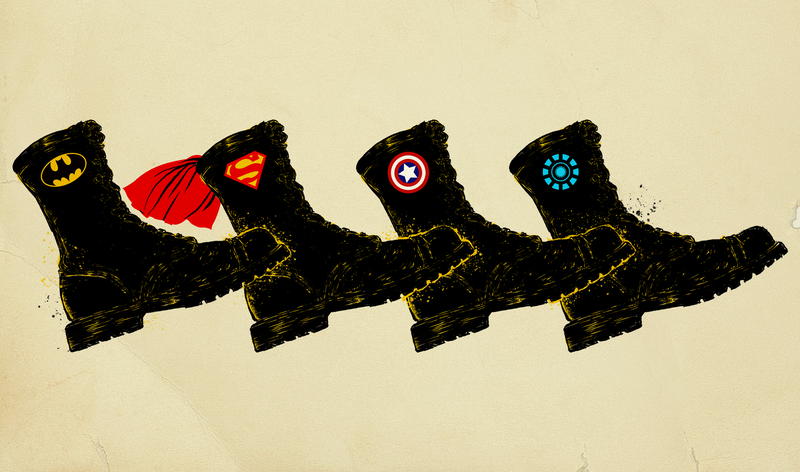
A few days ago, many people were shocked—shocked!—at a pair of new studies that found that many Americans have authoritarian tendencies. They want a strong leader, who can sort out “those” people. This went against everything we had lazily chosen to believe about America! But it’s also pretty apparent if you pay any attention at all to the headlines about police violence and the rise of a certain would-be strongman. And that makes it especially fascinating that this year’s two biggest superhero movies appear to be, at their root, about the seductive power of fascism.
Minor spoilers for Batman v Superman and Captain America: Civil War ahead...
So first off, full disclosure: I have not seen either Batman v. Superman or Civil War yet, but between the trailers and the interviews, I feel like I have a pretty good idea what they’re about. And they’re surprisingly similar, at least on the surface level.
In both films, heroes are held to account for mass destruction. (In Metropolis, or in the fight against Crossbones.) The main person who’s held responsible is a youngish boy scout who dresses in patriotic colors, and who defends his right to use his incredible powers, even if people might get hurt.
Opposing the boy scout is an older rich guy, who wears a high-tech suit of armor and believes that no man should have as much uncontrolled power as the boy scout. They fight. And fight. And fight and fight and fight. In the end, they realize they’ve been played and unite against the real enemy: Lex Luthor, or Baron Zemo. (Civil War has not chosen to show us as much of its ending as Batman v Superman, so that last bit about Baron Zemo is just guesswork on my part.)
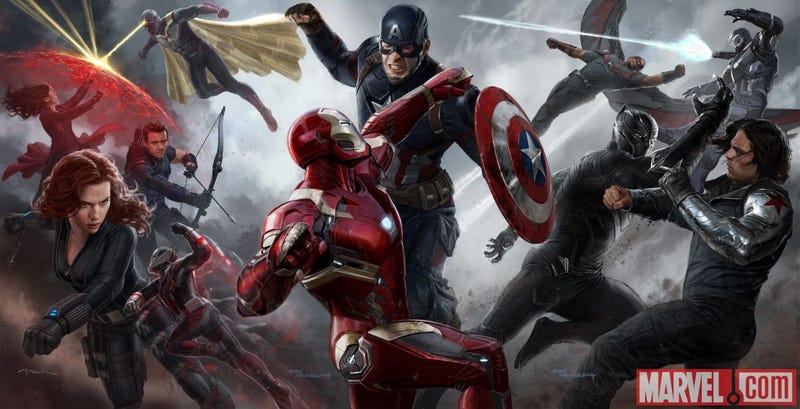
These films are all about a man with superpowers and colorful clothes, and the question of whether he (and his friends, in Civil War) have too much power and too little accountability. Even though Captain America and Superman have, at various times, been symbols of state power (or tools of the state), this time around they’re rogue actors whose individualism, it’s argued, needs to be crushed for the good of the masses.
The crucial distinction between Civil War and Batman v. Superman is twofold, of course: In Civil War, there are teams rather than just two heroes fighting. And in Batman v. Superman, there’s no quasi-governmental organization (like the “Sokovia Accords”) trying to get Superman under control, although we do see him answering to the government in hearings ‘n’ stuff. There’s just a crazy rich guy.
So how are these films dealing with the question of power and authority, and how could that speak to the zeitgeist in our very, um, special election year?
Bruce Wayne = Donald Trump
In Batman v Superman, Bruce Wayne is a grandstanding billionaire whose defining trait is his xenophobia. Sound like anyone we know?
By all accounts, Bruce makes a number of speeches in the film about how Superman cannot be trusted because he is an alien. (And in these sorts of stories, fear of aliens is routinely a proxy for real-life debates about immigration, terrorism, crime, etc. Just see Syfy’s new series Hunters, which is explicitly about terrorism, only with aliens as the terrorists.)
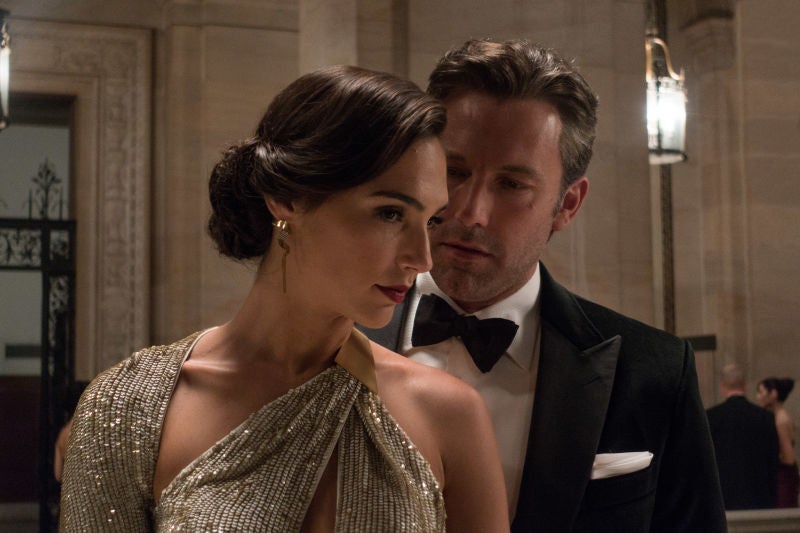
In addition to his xenophobia, another one of Batman’s defining traits is his brutality: He’s vicious in his assaults on crime. He apparently goes around burning a Bat-shaped brand into the criminals he catches.
People routinely describe Batman as a fascist, because he’s a wealthy elitist who goes into the inner city to beat up poor people, and he uses his immense wealth to arm himself for this urban combat. (Google “Batman fascist” and you get around 300,000 hits.) But all the imagery we’ve seen of Bats in this movie seems to play up his jackbooted thug side—and Snyder has said many times it’s loosely inspired by The Dark Knight Returns by Frank Miller, Klaus Janson and Lynne Varley, the one Batman comic where he stops fighting the tendency of random people to wear his emblem and follow him. In The Dark Knight Returns, Batman willingly assembles an army of young skinheads, who become his shock troops in taking back Gotham City.
And meanwhile, the trailers foreground some weirdly fascist imagery about Superman. At one point, he’s actually surrounded by stormtroopers wearing his “S” insignia on their shoulders, but that’s a dream sequence where Batman imagines the worst that could happen if Superman is left unchecked. I think this is supposed to be Batman projecting his own fears onto Superman—so of course, he imagines Superman becoming a Nazi leader. But we also see scenes of ordinary people mobbing Superman and trying to touch him, like a religious icon, which is just weird and plays into the “Jesus” imagery in the previous film, Man of Steel.
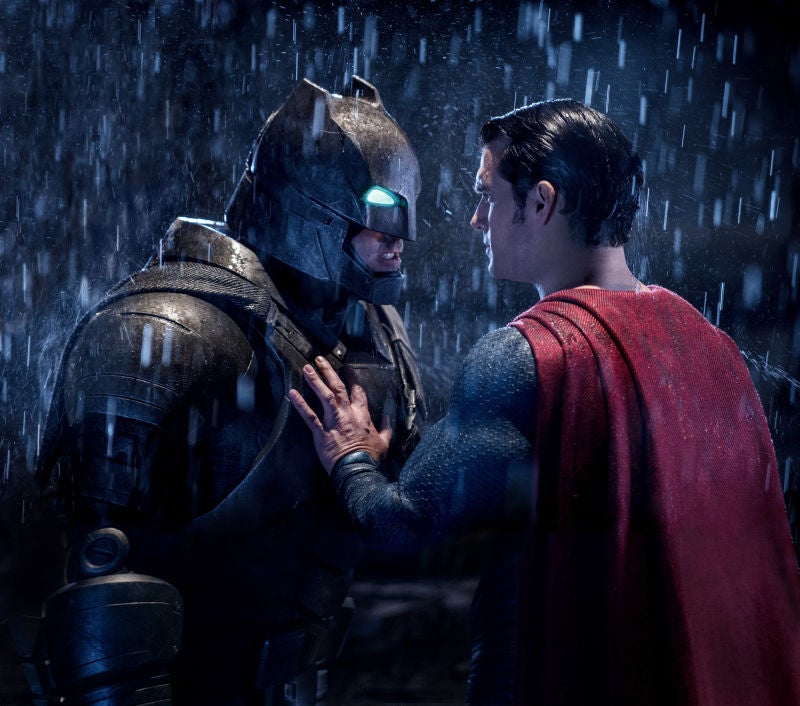
As much as Batman v Superman superficially owes a debt to Miller’s The Dark Knight Returns, it’s also clear that Snyder is drawing stylistically and thematically on Watchmen, the graphic novel by Alan Moore, Dave Gibbons and John Higgins—which Snyder previously adapted to a film in 2009.
Watchmen takes a lot of the critiques of superheroes that people had been making, both inside and outside comics, and makes them the main text for arguably the first time. The comic’s supersoldier, the Comedian, is compared explicitly to a Nazi, and his brutality in helping America to win an alternate version of the Vietnam War makes him not only an instrument of state power but also an avatar of the state. Joining him in this is Dr. Manhattan, a being of nearly limitless power, who then becomes the ultimate American deterrent and proof that “God exists, and he’s American.” Another character, the vigilante Rorschach, carries on a war against urban crime every bit as cruel and obsessive as Batman’s.
Here’s how Snyder described Watchmen in 2007: “In my superhero movie, the bad guy wants world peace, Superman doesn’t really give a shit about humanity, and Batman can’t get it up.” That combination of impotence and heedless violence seems to be at the root of Snyder’s vision of superheroes in general.
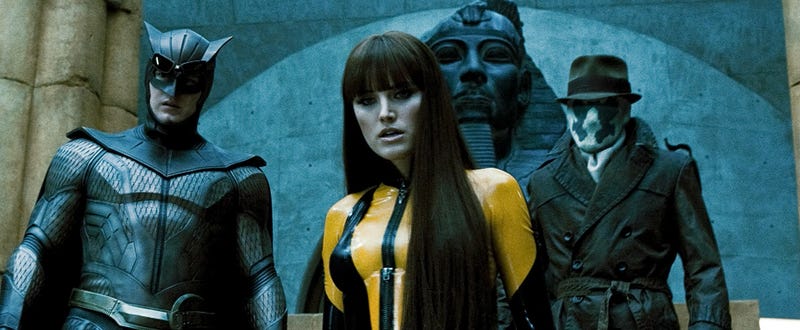
Snyder’s movie of Watchmen is often at its most vivid when it’s dramatizing these wartime atrocities and other moments of brutality, and his somewhat fetishistic lens seems ideally suited to conveying the allure (and dark side) of fascist hero-worship. He seems very much to be bringing that same aesthetic, and some of those same concerns, to Batman v Superman.
In any case, the fact that we’re getting a highly stylized movie about a billionaire who categorically hates and distrusts the “other” and wants to know if you bleed, at the exact moment that Republican frontrunner Donald Trump has been advocating bizarrely harsh policies against Mexicans, Muslims and others, is sort of fascinating. But more on that in a minute.
Civil War’s roots in the War on Terror
Meanwhile, Marvel’s new movie Civil War jettisons all but the basic idea of the 2006 comics event of the same name—Captain America and Iron Man clash over whether superheroes should be under the control of some kind of state-sanctioned entity. But the roots of this storyline are still very much connected to the War on Terror, which pop culture was just beginning to question 10 years ago.
Civil War is, at its heart, one of the many stories about “liberty versus security” that people were writing in the wake of 9/11 and America’s punitive response to a terror attack on our soil. The freedom of superheroes to do their superheroic thing is placed against the need of ordinary people to feel as though everything is under control. And if you follow the “liberty versus security” thread to its ultimate extreme, the nightmare scenario is a world of total state control in the name of safety.
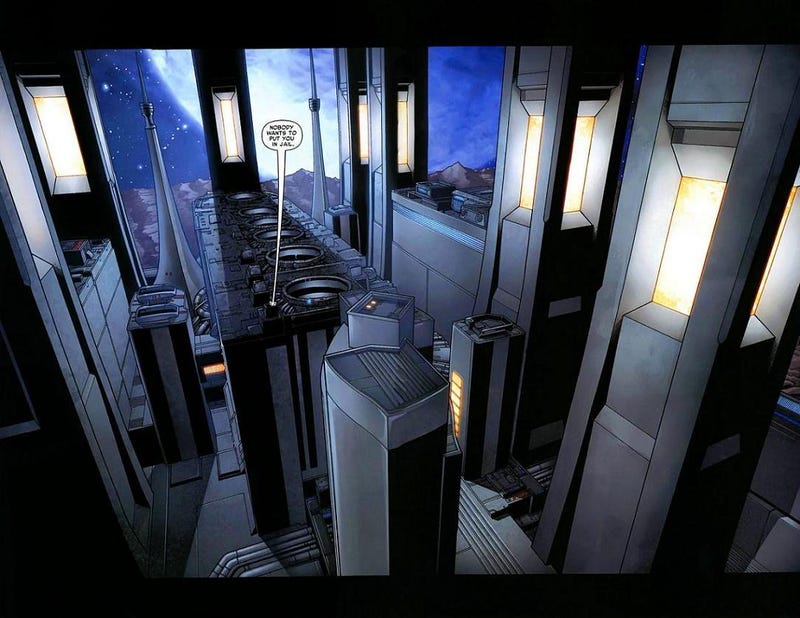
The Civil War comics push the parallels with the War on Terror to their limit—including a superheroic Guantanamo Bay (in the Negative Zone) and a super-charged surveillance state. We definitely will not be seeing super-Gitmo in this movie. But the basic conflict, of Captain America’s individualism against Iron Man’s authoritarianism, is baked into the story.
[Updated: Commenter Kenny Powers points out there actually is a super-Gitmo in the most recent trailer for Civil War, but it’s in the ocean, not the Negative Zone.]
And just as Batman v. Superman depicts Batman as a billionaire thug and Superman as a Jesus figure who risks being held up as a sanctified leader, there are two conflicting visions of “superhero as fascist” at play in the Civil War concept. Captain America and his Avengers risk being so powerful that he decides what’s right for everyone, but Iron Man risks becoming the tool (and representative) of the very same military-industrial complex that he rejected, back in his 2008 origin-story film.
So these two movies draw their inspiration from Watchmen (and The Dark Knight Returns) on the one hand, and Civil War on the other. Both pieces of source material are often heavy-handed in grappling with questions like whether it’s worse to be a tool of the state or a rogue strongman, and also how high a price you’re willing to pay for safety and comfort. And in fact, these questions have been major concerns in superhero stories for decades—and they’re probably the main reason why superheroes are so inherently political.
Power and Responsibility
So if you accept that both Batman v Superman and Civil War have themes of authoritarianism, violence, whether we can trust outsiders, and the responsible use of power, then the timing appears to be spot on—as Republican presidential frontrunner Donald Trump calls for a ban on Muslims entering the country and suggests that mosques should be monitored, if not shut down outright.
Anything that gets us thinking and talking about the abuse of power is a good thing at this moment.
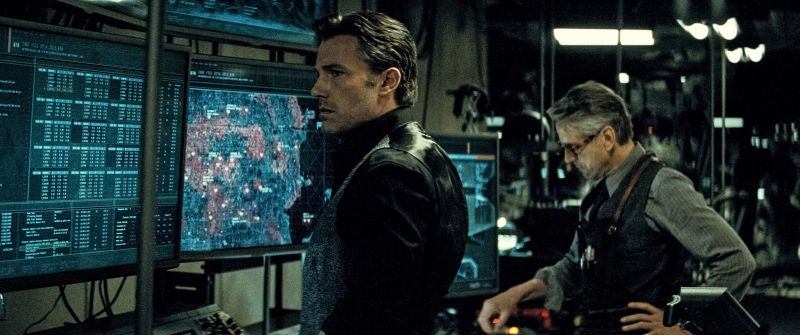
Of course, this incredible timing is at least partly an accident—these movies were planned years ago, and Hollywood production schedules don’t allow for lightning-fast, up-to-the-minute political commentary. But at the same time, these questions about just how far we’re willing to go to feel safe, and just how much trust we ought to place in a few powerful individuals, have been bubbling up for over a decade. (Witness Civil War’s 2006 publication.)
And at the same time, superheroes, as a nebulous genre, are pretty much made for discussing these types of issues. Superheroes have always been metaphors for power—both the power of the individual and the power of the state. At his most basic, a character like Superman is a fantasy about being completely unfuckwithable.
As Gerard Jones writes in his indispensible history of early superhero comics, Men of Tomorrow, part of the appeal of the somewhat thuggish early Superman was his purity as a power fantasy. Jones (who wrote some great superhero comics himself) writes of the discovery that “a young man could graft the superheroic fantasies that adults thought were sweet and silly onto a real rage... That had always been Jerry and Joe’s special insight: You could want the invulnerability and the power, but you had to laugh to keep people from knowing how badly you wanted it.”
http://www.amazon.com/Men-Tomorrow-G...
The basic appeal of the superhero is that nobody can tell you what to do—and it’s not a huge leap from that idea to the notion that maybe you can decide what’s best for everybody else.
You could argue the central premise of superhero comics has usually come back to Spider-Man’s motto: “With great power comes great responsibility.” The word “responsibility” in this context has two different, almost opposite, meanings. It can mean “obligation,” as in “the responsibility to help those in need.” Or it can mean “restraint,” as in “using your powers in a responsible manner.”
Spidey’s early comics mostly dealt with the first meaning of “responsibility,” but over time, the tension between those two meanings of the word has come to more prominence.
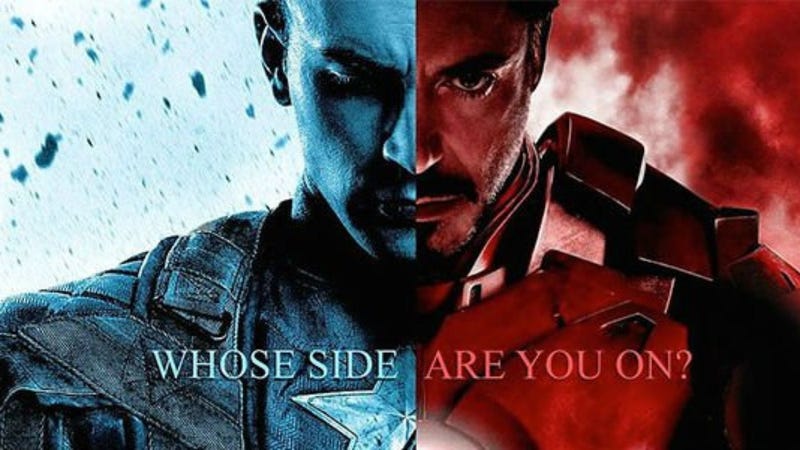
When superheroes clashed in comics back in the day, it was usually either a misunderstanding, or some version of the “tool of the man” argument. Batman sees Superman as a tool of the man in The Dark Knight Returns, and Superman in turn accuses Batman of being a lawless renegade in John Byrne’s Man of Steel #3. Green Arrow accuses Green Lantern of being a tool of the (blue) man in Green Lantern/Green Arrow, and a few years later, Captain America discovers that Richard Nixon is a supervillain and changes his name to Nomad.
So baked into the superhero genre is an acknowledgement of deep-seated rage, against those who have made us feel powerless, and a craving to have the power to make everybody respect us. Over the decades, the superhero genre has gotten more self-aware and has tried to critique and examine that rage and that craving—with Watchmen and The Dark Knight Returns standing as two of the most prominent attempts.
I don’t expect either Batman v. Superman or Civil War to offer an explicit critique of our collective fantasies about power and invulnerability—fantasies that all our political leaders, to some extent, have been pandering to for years. But both films seem at least to be raising potentially uncomfortable questions about why we crave the ability to beat up absolutely everybody, while wearing a shiny uniform.
In the end, I can guarantee that nobody will “win” in either showdown (or any victory will be pyrrhic at best)—but along the way, countless moviegoers might be forced to think for a moment about what kind of responsibility goes along with the use of power. Let’s hope so, anyway. For all our sakes.